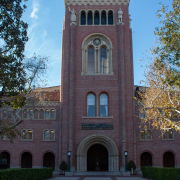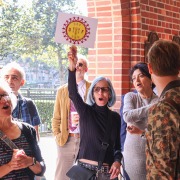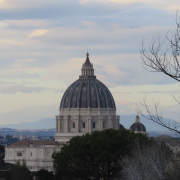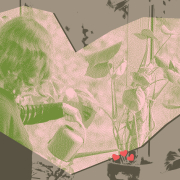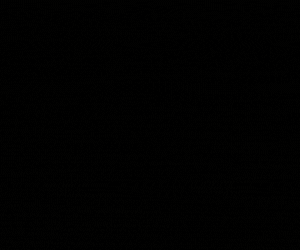Sundays, World War I and getting to do things
I first started getting the Sunday scaries junior year, lying in bed and scrolling through class readings. I was waiting for a boy to text me back, as I knew he would around 8 p.m. every Sunday night. It’s shocking how easy it is to learn someone’s schedule.
Junior year’s question: would he bluntly reply to what I had said previously, leaving me to continue the conversation? Would he reply, and then follow up to ask my opinion? Or, would he reply, and then say that he wanted to see me Wednesday afternoon?
I could lie in bed, scrolling thoughtlessly through those readings, clutching my water bottle for hours waiting for that text, sick to my stomach with uncertainty.
My senior year Sundays look different. I decided to go to law school, which offers a degree of five-year-plan security, but I need to take a gap year or two, and the uncertainty of my postgraduate future coats my chest and shoulders like a lead vest. During the week, between classes and homework and running the News section, the load seems lighter. On Sundays, when all I have to do is laundry and cooking, my podcasts and calls with my mom can’t keep it off. How many other people are applying for the same fellowships? I work myself into a doom spiral, listing all the ways these invisible applicants must be more qualified than me, and all of the things I should have done to improve myself.
I’m not an anxious person, and I certainly don’t qualify for anything close to a clinical anxiety diagnosis. My Sunday scaries are isolated events, when my desire to go back to the freedom of freshman year and the seemingly insurmountable fear of a future — a life — I cannot control leaves me slumped in an unmade bed, listening to the same audiobook recordings of David Sedaris’s “Me Talk Pretty One Day.”
In the trenches of World War I, British soldiers sang a morbid parody of the Scottish New Year’s tune “Auld Lang Syne”: “We’re here, because we’re here, because we’re here, because we’re here.” They lamented the infinite hell of a war they did not ask for, the apathy to a cause they had no stake in but were expected to die for.
That’s a little much for comparison to young adult life, but we did not ask to grow up either; we did not ask to leave behind swing sets and circle times, to enter a world where we don’t know if we’ll ever make enough to own our own homes — USC degree or not.
I know I should be using those hours to apply for jobs, to study harder, to get the experience I need to succeed later. But oh, God, what if it isn’t enough? What if everything I do is never enough?
Taylor Swift and Phoebe Bridgers (don’t side-eye me for this, they’re popular because they’re good) have a great line in the song “Nothing New”: “How can a person know everything at 18, but nothing at 22?”
At 18, fresh off the high of being a 17-year-old dancing queen, I had it all figured out. I had just been accepted to my dream school. I’d move to the California sunshine, I’d rush a sorority, I’d get my name in research papers by the time I was 20. Bound for a doctorate, academic and social glory, the five-year plan I clung to was in the palm of my hand. I’d have everything high school denied me.
And then the coronavirus pandemic hit, and depression hit me like a freight train. Living under full lockdown in Seattle, I didn’t leave my house from March until July. Everything I had spent my youth working for was set to come to fruition that spring, and my years of grueling, desperate work were rewarded with silence. I changed my major and contemplated transferring to my state school. It’s not only that my perfect plan wasn’t applicable anymore, rather, for the first time in my life I had nothing left to fight for. My identity, which was woven so tightly to my motivation, crumbled. I had absolutely no idea who I had become.
I think I’ve spent much of the last four years expecting the other shoe to drop. I’ve come to expect chaos and failure for reasons that I cannot plan for or control. It leaves me paralyzed, wondering why I should bother in the first place.
 “Tell the professor I have a cold.”
“Tell the professor I have a cold.”
Cartoon: Amelia Neilson-Slabach / Daily Trojan
I’m a retired cheerleader and a theater kid, so I’ve done a lot of fake smiling. Smile when you mess up, smile when you’re exhausted, smile when you’re miserable and just want to get the hell out. Though perhaps there’s an argument about keeping up an image of perfection to be made here, what I actually took away from those experiences is the psychological effect of smiling. Our brain associates smiling with happiness so strongly that if you make yourself smile, your mood improves.
The most important mental shift I’ve ever made was erasing the phrase “have to” from my vocabulary. Because it’s true- you are a human with free will. You don’t actually have to do anything. We live in a society that requests responsibility, so your lack of action may have negative consequences, but you still do not have to do anything, as long as you’re willing to accept those consequences. We tend to equate having to do something with being forced or required by those consequences.
I decided at the end of last year that I no longer have to do anything at all. Instead I get to do everything.
I get to wake up early to take a final. I get to complete my assignments, I get to take on daunting research papers. I get to go to law school. I get to find a fellowship for my gap year. I get to do my job. I get to grow up and I get to face the unknown.
Getting to do something that you should do has the same effect as fake smiling. Getting to do things started to remind me of the person I was before the pandemic: the best kind of bitch, the type of person who viewed everything through the lens of a fight to be won. I forgot how much I loved the fight of getting to, how the thrill of debate flung me out of bed in the morning and compelled me at my desk late into the night. There was the 17-year-old dancing queen again, the 18-year-old who knew everything, she’s back and she’s 21 and she doesn’t have to do anything. Instead, she gets to fight for all of it.
Getting to do something implies gratitude. When you get to do something, suddenly it’s exciting, it’s an opportunity, the thrill returns to the mundane. I get to go to the grocery store today! I get to pick out tomatoes and I get to go home to my kitchen and cook my dinner! Then, I get to do my 300 page readings because I get to go to this incredible university with incredible professors who teach me incredible things! I get the chance to show those professors that I’m smart, I’m responsible and I’m capable!
Even now, my Google Doc is telling me to change all of these uses of “get” to “have.” Go ahead and fill in the metaphor.
The late author Amy Krouse Rosenthal loved the WWI soldier’s Auld Lang Syne parody. She used to gather people in parks and city streets to sing it, and like the mind switch from having to do something to getting to do something, she made it triumphant. “We’re here because we’re here” becomes a chant of defiance, of gratitude, of opportunity. As John Green, a close friend of Rosenthal, among other descriptors, describes it in “The Anthropocene Reviewed”:
We are here—meaning we are together, and not alone. And it’s also a statement that we are, that we exist. And it’s a statement that we are here, that a series of astonishing unlikelihoods has made us possible and here possible. We might never know why we are here, but we can still proclaim in hope that we are here. I don’t think such hope is foolish or idealistic or misguided. We live in hope—that life will get better, and more importantly that it will go on, that love will survive even though we will not. And between now and then, we are here because we’re here because we’re here because we’re here.
Suddenly, being “here because we’re here” is a miracle. I am here. You are here. We get to be here. The sky is blue today. I am writing this, I get to be writing this, and you get to have taken a few minutes of time out of your day to to read this. The world is open again, and we get to fight for each other today.
My name is Eva, and it is Sunday, and I am still so scared. But I get to be scared. I hope you get to be scared today, too. ❋
Eva Hartman is the news assignments editor for the Daily Trojan. She is a senior majoring in international relations.




